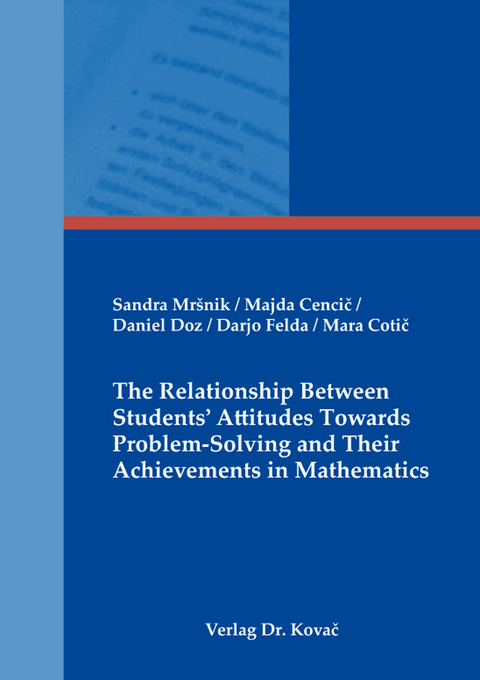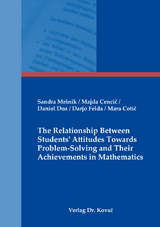The Relationship Between Studentsʼ Attitudes Towards Problem-Solving and Their Achievements in Mathematics
Seiten
2022
|
1. Aufl.
Kovac, Dr. Verlag
978-3-339-13074-7 (ISBN)
Kovac, Dr. Verlag
978-3-339-13074-7 (ISBN)
Different learning theories have attributed great importance to problem solving, but the perception of what influences the problem solving and what problem solving is really about differed significantly between theories. From the conception that only the reproduction of learned procedures is important for problem solving, to concepts advocating that the acquired specific knowledge suffices, that problem solving strategy is crucial, that automated mental skills play an important role, and to more complex concepts pointing out that the key is in the mere problem solving process where a student directs their thinking, operation and focus and evaluation of their own thinking. Also, the conception of the role of a teacher in problem solving has considerably changed: from a teacher ‘teaching’ students to solve problems, to the understanding that they only provide support with appropriate questions and direct the students’ thinking.
We wanted to explore influences on the achievements of students in the fourth grade of primary school in problem solving. Attitudes are often a phenomenon studied in teaching research, since they allow for an interpretation of relatively consistent ways of human behaviour and their forecasting. This is why we explored the attitudes of students towards problem solving in mathematics. The purpose of the study was to determine the achievements of students at different levels of knowledge in mathematics and impact of attitudes on these achievements.
In our work we prove that there is a correlation between the attitudes of the students towards problem solving and their achievements. We investigated whether attitudes impact students’ achievements on different levels of knowledge. We showed that there are no statistically significant impacts, at the level of the basic conceptual knowledge, however at the level of procedural knowledge, negative attitude adversely affects the achievements of students, while positive attitudes have a positive impact. Similarly, at the level of problem-based knowledge, a negative attitude adversely affects the view of students on problem solving, while positive attitudes have positive impact.
The results indicate the need to develop and promote a positive attitude towards problem solving. It is also necessary to organise a learning environment which promotes cooperation among students and allows peer learning. In addition, learning situations, when students describe the problem-solving process, explain the way to solution and justify it, are encouraging a deep understanding of the problems and therefore lead to higher achievements in problem solving.
We wanted to explore influences on the achievements of students in the fourth grade of primary school in problem solving. Attitudes are often a phenomenon studied in teaching research, since they allow for an interpretation of relatively consistent ways of human behaviour and their forecasting. This is why we explored the attitudes of students towards problem solving in mathematics. The purpose of the study was to determine the achievements of students at different levels of knowledge in mathematics and impact of attitudes on these achievements.
In our work we prove that there is a correlation between the attitudes of the students towards problem solving and their achievements. We investigated whether attitudes impact students’ achievements on different levels of knowledge. We showed that there are no statistically significant impacts, at the level of the basic conceptual knowledge, however at the level of procedural knowledge, negative attitude adversely affects the achievements of students, while positive attitudes have a positive impact. Similarly, at the level of problem-based knowledge, a negative attitude adversely affects the view of students on problem solving, while positive attitudes have positive impact.
The results indicate the need to develop and promote a positive attitude towards problem solving. It is also necessary to organise a learning environment which promotes cooperation among students and allows peer learning. In addition, learning situations, when students describe the problem-solving process, explain the way to solution and justify it, are encouraging a deep understanding of the problems and therefore lead to higher achievements in problem solving.
| Erscheinungsdatum | 31.10.2022 |
|---|---|
| Reihe/Serie | Studien zur Schulpädagogik ; 95 |
| Verlagsort | Hamburg |
| Sprache | englisch |
| Maße | 148 x 210 mm |
| Gewicht | 172 g |
| Themenwelt | Sozialwissenschaften ► Pädagogik ► Schulpädagogik / Grundschule |
| Schlagworte | Didaktik • Lernumgebung • Mathematikleistung • Pädagogik • Peer-Lernen • positive Einstellung • Problemlösung • Wissensebenen |
| ISBN-10 | 3-339-13074-4 / 3339130744 |
| ISBN-13 | 978-3-339-13074-7 / 9783339130747 |
| Zustand | Neuware |
| Haben Sie eine Frage zum Produkt? |
Mehr entdecken
aus dem Bereich
aus dem Bereich
für Kinder mit Down-Syndrom, Leseratten und Legastheniker
Buch | Softcover (2023)
Lehmanns Media (Verlag)
CHF 27,90
Grundlagen und Praxis
Buch | Softcover (2022)
Beltz (Verlag)
CHF 27,90
wie Lehrer, Eltern und Schüler guten Unterricht gestalten
Buch | Softcover (2024)
Klett-Cotta (Verlag)
CHF 33,55




